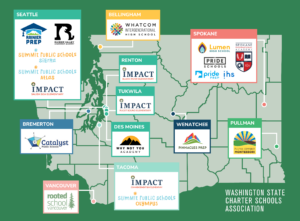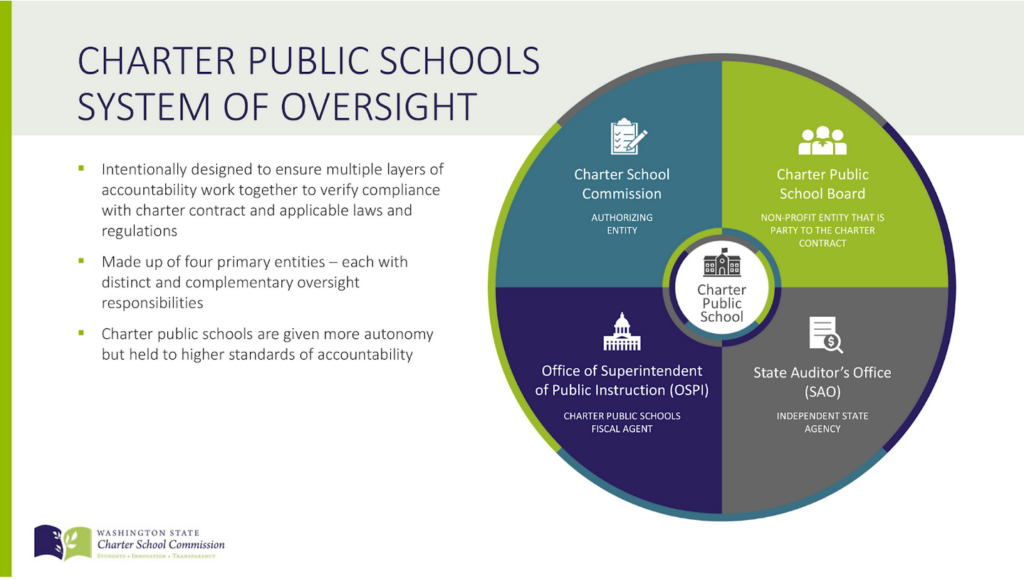Charter Public Schools FAQ

About Charter Schools
What is a charter public school?
In exchange for meeting the rigorous academic, fiscal, and operational requirements of their charter contracts, these particular public schools are empowered to develop, customize, and implement curriculum that specifically meets the needs of the students they serve.
Charter public schools, which by Washington state law, are operated by non-profit, non-sectarian organizations, are subject to many of the same requirements that govern all public schools, including health, safety, parents’ rights, civil rights, and nondiscrimination laws, teacher certification requirements, and statewide learning standards.
Visit the Academic Performace Data Dashboard
https://www.youtube.com/watch?v=RsPs4Tr4j_g
What makes charter public schools different from other public schools?
Charter public schools are community-rooted:
- 62 percent of students attending Washington’s charter public schools identify as Black, Indigenous, or People of
- Color, compared to just 50 percent of students statewide.
- There are over double the BIPOC teachers employed in charter public schools than in traditional public schools in Washington State
- A Harvard University study analyzing outcomes over the past 12 years found that charter public school students made more gains on reading and math tests than students in traditional public schools, especially low-income and Black students.
In exchange for higher levels of accountability, charter public schools have more freedom than traditional public schools to customize curriculum, take creative approaches, and offer greater personal attention, giving students from all backgrounds the chance to go to a school that works for them.
What type of academic results are charter public schools achieving?
The students at charter public schools are assessed using the same state learning standards as students at traditional public schools. To date, academic assessment results for charter public school students in Washington state are promising.
New data from the Smarter Balanced Assessment Consortium (SBAC) released by the Office of Superintendent of Public Instruction (OSPI) in September 2023 reveals that Washington State charter public schools are making significant strides in academic performance. Notably, Black, Latinx, and low-income students in charter public schools fared better than their peers in traditional public schools. The SBAC assessments, administered annually to students in grades 3-8 and 10, provide critical insights into student academic growth and readiness for college-level work.
For more information on student outcomes at charter public schools, we encourage you to review data in the 2022-2023 SBAC assessments. The results mark meaningful advancements toward improving the educational landscape across the state, particularly for systemically underserved communities.
How many charter public schools and students are there in Washington state?

There are 18 charter public schools in our state. Each one is a tuition-free, non-sectarian public school open to all students in the local community. There are currently approximately 5,000 students enrolled in charter public schools in Washington, representing 0.2 percent of public school students in our state (there are 2,370 traditional public schools in Washington).
Is there a charter public school in my area?
There may be! Here is a list of charter public schools operating in communities statewide. While there are ongoing efforts to change state law so that additional charter public schools could be authorized to operate, as of 2023 there are only 18 operating in Washington. Additional information is available from the Washington State Charter School Commission, the public agency serving as the authorizer of charter public schools in our state.
If you would like to learn more about how to advocate for more community-rooted charter public schools in our state, please sign-up for our action alerts.
Staff And Students
Who attends charter public schools in Washington state?
62 percent of students attending Washington’s charter public schools identify as people of color, compared to just 50 percent of students statewide.
A Harvard University study analyzing outcomes over the past 12 years found that charter public school students made more gains on reading and math tests than students in traditional public schools, especially low-income and Black students.
Above all, charter public school students are accessing opportunities that many families dream of for their students. 70 percent of charter public school graduates from the Class of 2022 applied to and were accepted into four-year colleges. For those who are ready for a career, some charter public schools work to identify internship, apprenticeship, and other opportunities to learn new skills they can build upon as they move forward in their lives after high school.
In 2023, we spotlighted seniors graduating from charter public schools across the state:
- Denisha Shipps – Summit: Olympus, Tacoma
- Kaden Boren – Lumen High School, Spokane
- Marshawn Jones – Rainier Valley Leadership Academy, Seattle
- Najmi Iman – Summit Public School: Atlas, Seattle
- Winter Bee – Whatcom Intergenerational High School, Bellingham
Who teaches at Washington state’s charter public schools?
The teachers at charter public schools in our state are subject to the same state teacher certification requirements as teachers in traditional public schools. Teachers in charter public schools are also much more likely to reflect the communities that they serve – there are 3x more BIPOC teachers employed in charter public schools than in traditional public schools in Washington State.
Listen to some of Washington’s charter public school teachers talk about:
How can students with disabilities benefit from charter public schools in Washington?
Students with disabilities must have equitable access to an education in Washington State, in traditional public schools and in charter public schools. Washington’s charter public schools each are unique, but all are open to all students and serve students with special needs. A 2017-2018 study conducted by the Center on Reinventing Public Education (CRPE) found that charter public schools in Washington served higher percentages of students with special needs than their traditional public school peers and importantly, that students with disabilities were being educated with their peers without disabilities 80 to 100 percent of the day.
Do charter public schools provide meals and transportation to students ?
Like all public schools in Washington, charter public schools participate in the National School Lunch Program, which ensures that students who qualify based on family income receive free, healthy school meals.
Charter public schools are open to all and there are no attendance zones. Washington’s charter public schools provide school bus transportation to families within a certain vicinity of the school. For families outside that vicinity, students can still enroll and attend, but caregivers must provide alternate transportation.
Accountability
How are charter public schools funded?
Charter public schools in Washington are public schools. This means that they are tuition-free, open to all and subject to public oversight. Funding for charter public schools is allocated per student by Washington State, just like traditional public schools. Unfortunately, students at charter public schools are not currently supported by the funding made available in local school levies for traditional public schools. This funding inequity exacerbates historical inequities in our communities. As State Representative Debra Lekanoff wrote in a guest column for the Everett Herald recently:
“The state readily makes an investment in its traditional public schools, and charter public school students deserve the same expression of confidence in their future from the people elected to represent them.”
The Legislature has taken steps to address this funding inequity and advocates across the state are working tirelessly to close this gap completely, and permanently. Today, fundraising from philanthropic organizations and other community supporters is regularly necessary to ensure charter public school students have the same resources as their peers in traditional public schools.
How are charter public schools managed ?
Charter public schools are subject to strict oversight and regular compliance checks within a multi-agency regulatory framework that includes the Office of the Superintendent of Public Instruction, the Washington Charter School Commission, local School Leaders, and the State Auditor.
Each school is managed by its own local School Board, which is required to hold regular public meetings just like their peers at traditional public schools.
How are charter public schools held accountable?
Charter public schools are subject to strict oversight and regular compliance checks within a multi-agency regulatory framework that includes the Office of the Superintendent of Public Instruction, the Washington Charter School Commission, a non-profit school board, and the State Auditor.
This system of accountability requires additional requirements for charter public schools than is required of traditional public schools. They are called “charter” public schools because they are subject to strict requirements outlined within the confines of a contract – their charter – with the state. This higher level of accountability on behalf of student outcomes allows for greater flexibility in serving the unique needs of their community. For a detailed overview of this accountability system – including the rigorous application schedule for opening a new charter public school and the regular renewal process – please visit the resource page offered by the Washington State Charter School Commission.

Do charter public schools provide meals and transportation to students ?
Like all public schools in Washington, charter public schools participate in the National School Lunch Program, which ensures that students who qualify based on family income receive free, healthy school meals.
Charter public schools are open to all and there are no attendance zones. Washington’s charter public schools provide school bus transportation to families within a certain vicinity of the school. For families outside that vicinity, students can still enroll and attend, but caregivers must provide alternate transportation.
Do charter public schools follow the same education laws and standards as other public schools?
Yes.
Are there for-profit charter schools in Washington state?
No.
Charter public schools in Washington are non-profit entities like all public schools. In our state, every charter school is tuition-free, public, and open to all.
Community Engagement and Opportunities
What is the role of parents in charter public schools?
- ADVOCATE on behalf of your student’s opportunities in the larger public school community
- DONATE to your local public school to support opportunities for your student at their local charter public school
- LEARN about the history of public education and the opportunities that community-rooted charter public schools offer students in our state
- ENGAGE with the leadership, staff, and teachers at your local charter public school as an integral member of your local community
- LEAD local accountability by reviewing the role of parents in a school’s oversight and connecting with your school’s leaders
How do you start a charter public school?
Today, only 18 charter public schools have been authorized and the state legislature has not extended the time frame for establishing additional charter schools.
While we continue to push for policy change, prospective school leaders can explore our online resources for starting a new charter public school. The Washington State Charter School Commission also offers additional technical information online regarding the accountability system governing the expansion, renewal and operation of charter public schools.
